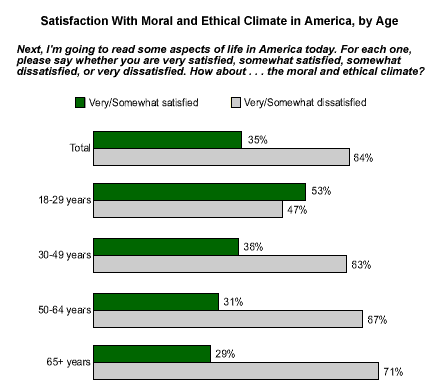Americans' morals and ethics are currently under heavy fire. The "wardrobe malfunction" that exposed Janet Jackson's breast on primetime television during the Super Bowl halftime show has ignited a firestorm of discussion about decency in broadcasting and the general state of morality in America. Corporate scandals, such as the Enron, Martha Stewart, and mutual fund debacles continue to cast long shadows over the reputation of U.S. corporations. And the issue of gay marriage has social conservatives and liberals fighting about the fundamental definition of morality in this country.
Is the moral and ethical fabric of U.S. society coming apart at the seams? A large percentage of Americans seem to think so, although many of the country's youngest adults are not so sure.
As part of its annual Mood of the Nation poll, Gallup asks Americans how satisfied they are with "the moral and ethical climate" in America today. According to the January 2004* results, almost two-thirds (64%) of Americans are "very" or "somewhat" dissatisfied with the country's moral and ethical climate, while just 35% are "very" or "somewhat" satisfied.
However, younger Americans (those between the ages of 18 and 29) tend to be quite a bit more optimistic about the moral and ethical climate in the United States than older Americans are, a pattern that has existed for several years. According to aggregated survey results from the 2003 and 2004 Mood of the Nation polls**, a slim majority (53%) of 18- to 29-year-olds are satisfied with the moral and ethical climate, compared with 47% who are dissatisfied. In contrast, only about a third of U.S. adults in older age categories are satisfied with the moral and ethical climate in America.

The views of Sean, a 26-year-old athletic coach from New Jersey, typify those of many young adults. Although he is not brimming with optimism about the nation's moral and ethical climate, he is not necessarily troubled by it either. "I'm satisfied [with the moral and ethical climate in America] in the sense that there is not a total lack of morality and ethics. But I would like to see people be more proactive in carrying out what they believe in."
Life experience could explain younger Americans' more positive views on this question. Adults under the age of 30 grew up in the era of the Internet, music videos, and cable television shows that continued to push the moral envelope, and may not remember a time when profanity and sexual content were more taboo. Additionally, research shows that younger people's views on political issues tend to be less firmly held and less well-established than older Americans' views.
Although the data show that more than half of young adults are satisfied with the moral and ethical climate in America, there are many who disagree. Michelle, a 27-year-old data architect from Virginia, says that she is somewhat dissatisfied with America's moral and ethical climate. "I think that there is an increasing pervasiveness of sexual and violent content, not to mention an ever-increasing popularity of the use of expletives (bleeped or not), in all forms of media, including television, movies, radio, print, etc. I do, however, feel that it is my right not to watch or listen to the programs, read the ads, see the movies, etc."
Antoine, a 24-year-old Maryland man who works for a Fortune 500 company, is very dissatisfied with morals and ethics in America, particularly from a business perspective: "Most decisions that are made are ego- and money-driven. The bottom line never has much to do with ethics or morals."
Bottom Line
Although young adults are more positive than other Americans are when it comes to ethics and morality, the fact remains that nearly half of 18- to 29-year-olds are dissatisfied with the moral and ethical climate in America today. The shock value of events like the Super Bowl halftime show fiasco, along with heavy media coverage of political, corporate, and church-related scandals, have left most Americans with a fairly dim view of morality and ethics in their country.
*Results are based on telephone interviews with 1,004 national adults, aged 18 and older, conducted Jan. 12-15, 2004. For results based on the total sample of national adults, one can say with 95% confidence that the margin of sampling error is ±3 percentage points.
**Results are based on aggregated data from telephone interviews with 2,004 national adults, aged 18 and older, conducted Jan. 12-15, 2004, and Jan. 13-16, 2003. For results based on the total sample of national adults, one can say with 95% confidence that the margin of sampling error is ±2 percentage points.
For results based on the sample of 320 adults between the ages of 18 and 29, one can say with 95% confidence that the margin of sampling error is ±6 percentage points.